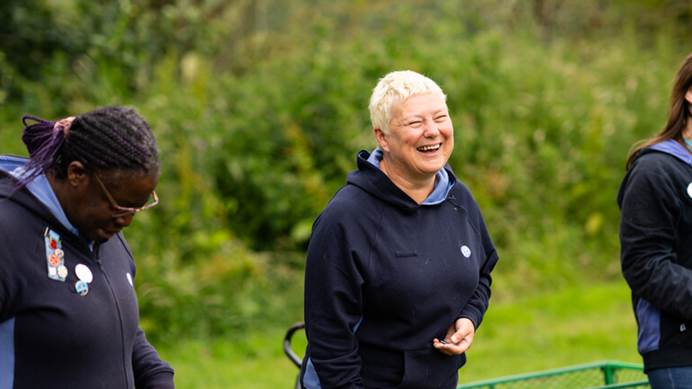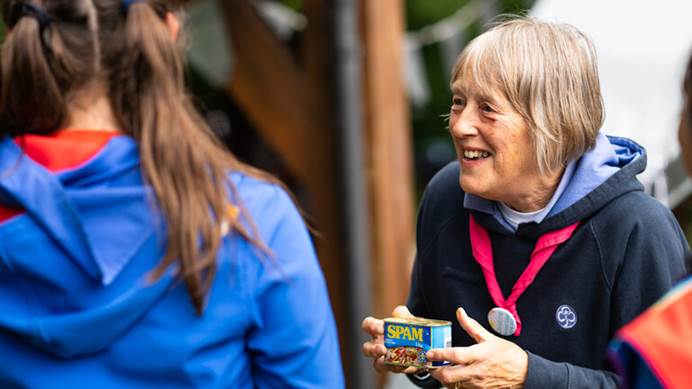Safer guiding training and criminal disclosure checks
Making sure our volunteers have the necessary checks and training
Last updated: 4 December 2024
All adult volunteers must have either safer guiding or safer guiding basics and a disclosure check, if their role needs it.
Completing safer guiding is part of the safeguarding policy. Some roles need volunteers to do a criminal disclosure check, which is part of the recruitment and vetting policy. Safer guiding and most disclosure checks need to be renewed every 3 years.
Not completing or renewing mandatory training or criminal disclosure checks may mean a volunteer’s membership is withdrawn or refused. We want to avoid this happening, so we regularly remind volunteers about their training and offer help during the process. Commissioners also have an important role to play in reminding and helping volunteers.
How safer guiding renewals work
Volunteers’ safer guiding training will need to be renewed every 3 years. They’ll be able to see when they need to renew by logging in to GO.
If a volunteer has previously completed a safe space
Volunteers can complete safer guiding at any time before their highest level of a safe space expires. Their renewal date will then be 3 years from completion.
Timeline of the compliance process
Volunteers will receive an email 40 days before they need to renew any mandatory training or criminal disclosure checks.
Here’s the timeline for each stage of the compliance process. As a commissioner, you’ll receive an email if the volunteer reaches the ‘at risk’ stage. This will ask you to support the volunteer. The role will become active pending and they won’t be able to volunteer unsupervised.

- Stage 1: Inform (40 days before your valid to date).
- Stage 2: At risk (40 days after your valid to date).
- Stage 3: Sanction (7-10 days after stage 2 ends).
Your valid to date is the date you need to complete the training or start the disclosure check by.
This can be done at any time if a volunteer needs more time. Get in touch with [email protected] to request their deadline extension based on mitigating circumstances.
Mitigating circumstances could be personal events or situations that place significant barriers in the way of doing what they need to. Some examples are:
- The volunteer is seriously ill or unwell.
- The volunteer is a full-time carer for a relative who's sick or unwell.
- The volunteer is recently bereaved.
- If they haven’t got the technology to do the training.
When looking at mitigating circumstances, the complaints and compliance team will ask the commissioner to think about:
- Have reasonable adjustments been offered?
- Is the volunteer still active or are they stepping back from guiding?
- Will the volunteer be able to complete the training or start the criminal disclosure check before the deadline?
Once this information has been provided, the mitigating circumstance will be considered by the complaints and compliance team.
If the mitigating circumstance is verified, the volunteer will be given an extension. The new deadline will be based on individual circumstances.
A commissioner can’t grant the mitigation, but they can discuss it with the volunteer first and go through the options.
Ideally, the volunteer will contact the complaints and compliance team directly with the details. A commissioner can talk to the complaints and compliance team on their behalf.
The volunteer and their commissioner will both be copied into all messages.
What happens when training isn't renewed or a criminal disclosure check isn't started?
If a volunteer doesn’t complete training or start a disclosure check and is an existing Girlguiding member, their membership will be withdrawn.
If a volunteer is asked to start their disclosure check as part of the application process and then doesn’t, their membership will be refused.
Withdrawal or refusal of membership means the person can’t attend any Girlguiding function, event or meeting.
If they have a child in Girlguiding, they may attend as a parent, for example dropping off or collecting their child. But they can’t help with any events, trips or outings.
Volunteers have the right to appeal against a withdrawal or restriction by providing new information or evidence which hasn’t already been considered. Whilst the decision to refuse membership can’t be appealed, if a volunteer thinks this decision has been made unfairly, they should let us know. Information must be sent in writing to [email protected] within 28 days of the date of withdrawal, refusal or restriction.
The appeal process following withdrawal or refusal on the above grounds is managed differently to appeals following an investigation. The decision to uphold an appeal will be considered by the complaints and compliance team.
A volunteer can apply for a review of the decision to withdraw or refuse their membership after 3 years or a significant change in circumstances. As part of any application to re-join, we’ll need to explore that they've understood the implications of not having the right training or check.
Your questions answered
Young volunteers, such as young leaders and young external volunteers aren’t affected as the compliance withdrawal process only applies to those over 18. They only complete the a safe space for under 18s.
They'll need to change their role to an adult volunteering role after their 18th birthday.
Young volunteers don’t need to undertake disclosure checks.
We strongly recommend that all young volunteers complete the a safe space activity for their age group as part of their induction to volunteering with a unit or at an event. You can find details of how they can do this on the a safe space for under 18s webpage.
There are help files on GO which tell you how to view people who require safer guiding or disclosure checks.
The process is a manual one. It’s completed by the complaints and compliance team at HQ working with the volunteer’s country or region. The team checks each volunteer’s record and approves it with the country and region chief commissioner. Once this has happened, the compliance team will email the county commissioner when the volunteer gets withdrawn on the system. The volunteer will get an email telling them that their membership has been withdrawn from the date it is sent.
If a role requires the holder to do a safe space level 4, then provided they have safer guiding they won’t have their membership withdrawn. Level 4 will now be completed before a person starts the role that requires level 4.
The safer guiding e-learning has 4 short quizzes that volunteers need to pass to complete the course. There are 3 attempts to pass each quiz, and after the third attempt the quiz will lock. They can still complete other modules in the course but unless all 4 quizzes are passed then the overall course will remain as ‘in progress’.
If a volunteer fails 1 quiz
- Their commissioner will arrange for a safer guiding trainer to talk to the volunteer to check to their understanding of the topic.
- Once satisfied, completion should be added directly to GO as a local training. You should double check the remaining sections and quizzes are fully completed on the platform before doing this.
- Trainers can find copies of all the quiz questions and answers on the learning platform under trainer resources to support them with this conversation.
If they fail 2 or more quizzes
The volunteer will need to book on and attend a trainer-led session. They can do this via the learning platform or via their county training team.
Safer guiding basics
Safer guiding basics doesn't have a pass or fail quiz.
Supported volunteering role
There’s the supported volunteering role for volunteers who may need additional support to volunteer with us. This role doesn't have any safeguarding responsibilities and doesn't need safer guiding training. Read more about it on our adjustments for disabled members page.




